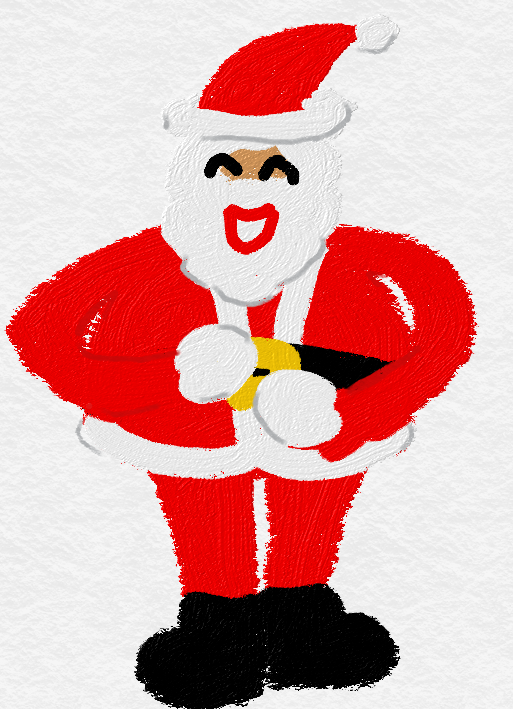Dear Language Nerd,
Where did Santa Claus pick up the name Kris Kringle? Or, for that matter, St. Nicholas? And how did he earn the title of Father Christmas? Frankly, having so many aliases only makes his breaking into houses all the more suspicious.
-Mr. Heat Miser
***
Dear Mr. Hundred-And-One,
Well, merry Christmas to you too, oh doubting one. We’ll start with St. Nicholas, because it’s straightforward – there really was a guy called Nicholas, in ye olde Lycia (now Turkey, woohoo!), and the Catholic church really did elevate him to sainthood. He was apparently a pretty cool guy, known for donating generously to the poor. Most famously, he once gave a bunch of young gals big bags of gold because they were too poor to come up with dowries themselves, but being hella modest he threw them (the bags) through the window (or, according to some variants, down the chimney, hmmm?) so they wouldn’t know who to thank. This is the beginning of the “gifts coming from an outside source” aspect that’s so important to the Christmas culture. St. Nick, I suppose I should add, is just a shortening of Nicholas.
St. Nick entered Dutch as Sinter Niklaas, which became Sinterklaas over time. A pile of Dutch people immigrated to the American colonies, and by the 1800s their name had been taken and Englishized as Santa Claus. That’s right, the Dutch gave us Santa as well as cookies. And sleigh. If you like our current Christmas terminology, thank a Dutch person.
No, really, go find a Dutch person and give them an extra Christmas present. Trust me, we’re about to get to the really exciting part. Though it requires going back a little further first.
The term Christkindlein was popularized by Martin Luther (not the “I Have a Dream” guy, the “I Have Some Theses” guy). In the 1500s, he was worried that not enough importance was being placed on Christmas because it was sharing the spotlight with another big holiday in December, that holiday being… wait for it… St. Nick’s Day, December 6th. It was a big event, because children received presents from this mysterious robed Nick fellow. People traded presents at Christmas too, but that was openly, so less exciting.
Apparently, the drama of St. Nick was getting too much attention for M.L.’s comfort. He figured that Nick’s public appeal was due to his strong audience recognition, and with that in mind he decided on a twofold plan: lower the appeal of St. Nick’s Day as part of his general anti-saint program, and bring the main figure of Christmastime more firmly into the public eye by promoting the role of Jesus as the giver of all gifts. This plan worked for a while. The popularity of St. Nick receded all across Europe, except among one tenacious group of people: you guessed it, the Dutch. Even when celebrating St. Nick was outright banned in the 1600s, the Dutch held on.* And then, as we saw above, headed over to America. Yeah, when history teachers want to get kids excited about immigrants coming to early America because of the religious freedoms, they should point out that part of this was the freedom to hang on to Saint Nick.
Ultimately, Luther’s plan backfired. Celebrating St. Nicholas was revived in the early United States, and in the following centuries Santa made his way back to Europe, giftier and more secular than ever. Even Luther’s special name was shortened to Christkind’l, which became Kris Kringle, which managed to attach itself to Santa. So instead of drawing attention away from the man in red, Luther put Santa into more direct competition with Jesus by strengthening Santa’s connections to Christmas.
Now Father Christmas is something else again. He was originally a whole other person, an English embodiment of the spirit of festivity and goodwill that emanates from people during Yuletide. As Santa Claus became more and more popular, these attributes got attached to him, and eventually the two myths merged. Basically, Santa Claus and Father Christmas met one night in a dark alley, and the next day no one could find Father C., and then Santa produced a will that said he got all Father Christmas’s stuff.
Which I guess could be considered a little suspicious.
Yours,
The Language Nerd
*They also hang on to Zwarte Piet, though, so tenaciousness is not infallible.
Got a language question? Ask the Language Nerd! asktheleagueofnerds@gmail.com
Twitter @AskTheLeague / facebook.com/asktheleagueofnerds
References this week include the helpful Wiki, as well as its bastard second cousin Wiki Names, the handy dandy etymonline, and a useful NBC article.
